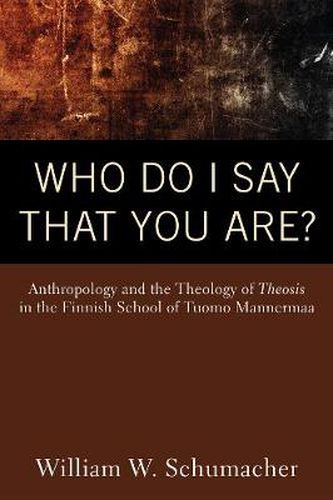Readings Newsletter
Become a Readings Member to make your shopping experience even easier.
Sign in or sign up for free!
You’re not far away from qualifying for FREE standard shipping within Australia
You’ve qualified for FREE standard shipping within Australia
The cart is loading…






This title is printed to order. This book may have been self-published. If so, we cannot guarantee the quality of the content. In the main most books will have gone through the editing process however some may not. We therefore suggest that you be aware of this before ordering this book. If in doubt check either the author or publisher’s details as we are unable to accept any returns unless they are faulty. Please contact us if you have any questions.
The question of what it means to be a human creature lies at the heart of contemporary wrestling with anthropology, and especially anthropology from a theological perspective. Through both historical and systematic engagement with the so-called Finnish school of Tuomo Mannermaa, this study explores and assesses the anthropological dimension of their theology of theosis, or deification. Mannermaa initiated a minor revolution in Luther studies and in contemporary Lutheran theology by interpreting Luther’s doctrine of justification to be a close analog to the Eastern Orthodox doctrine of theosis, but his ecumenical interests led him to minimize or overlook key themes in Luther and sharp distinctions between Luther and Orthodox theologians. Mannermaa’s colleague Simo Peura then developed this thesis with specific reference to anthropology in a way reminiscent of the sixteenth-century reformer Andreas Osiander. On closer inspection, the project of Mannermaa and his Finnish colleagues fails to understand adequately both Luther’s sources and his own theological development. In this study, a theological anthropology which is more consistent with Luther’s theology is developed, an anthropology which is determined by God’s address to his human creatures: what God himself says we are, and what he makes us by that word. Such an answer to the anthropological question refuses to flee from creation but instead upholds the complex and paradoxical nature of human beings as creatures, sinners, and saints.
$9.00 standard shipping within Australia
FREE standard shipping within Australia for orders over $100.00
Express & International shipping calculated at checkout
This title is printed to order. This book may have been self-published. If so, we cannot guarantee the quality of the content. In the main most books will have gone through the editing process however some may not. We therefore suggest that you be aware of this before ordering this book. If in doubt check either the author or publisher’s details as we are unable to accept any returns unless they are faulty. Please contact us if you have any questions.
The question of what it means to be a human creature lies at the heart of contemporary wrestling with anthropology, and especially anthropology from a theological perspective. Through both historical and systematic engagement with the so-called Finnish school of Tuomo Mannermaa, this study explores and assesses the anthropological dimension of their theology of theosis, or deification. Mannermaa initiated a minor revolution in Luther studies and in contemporary Lutheran theology by interpreting Luther’s doctrine of justification to be a close analog to the Eastern Orthodox doctrine of theosis, but his ecumenical interests led him to minimize or overlook key themes in Luther and sharp distinctions between Luther and Orthodox theologians. Mannermaa’s colleague Simo Peura then developed this thesis with specific reference to anthropology in a way reminiscent of the sixteenth-century reformer Andreas Osiander. On closer inspection, the project of Mannermaa and his Finnish colleagues fails to understand adequately both Luther’s sources and his own theological development. In this study, a theological anthropology which is more consistent with Luther’s theology is developed, an anthropology which is determined by God’s address to his human creatures: what God himself says we are, and what he makes us by that word. Such an answer to the anthropological question refuses to flee from creation but instead upholds the complex and paradoxical nature of human beings as creatures, sinners, and saints.